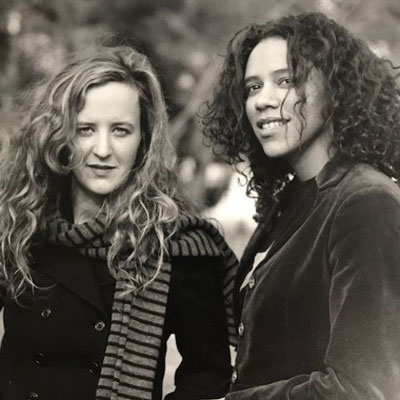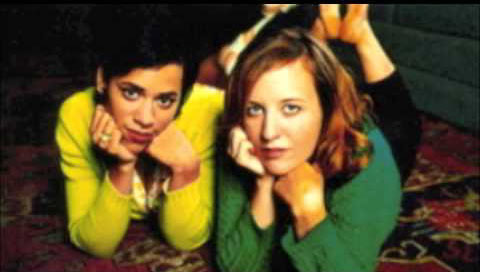SEPTEMBER 67

Lucky Shoe: An Album to Remember
By Kurt Wildermuth
(April 2021)
Remember September 67? Ah, those were the days, my friend. We thought they'd never end.
Just kidding. Since there's no apostrophe before the number 67, it's not an abbreviation for 1967. September 67 wasn't the beginning of fall after the so-called summer of love. It was a pop-rock duo, whose one album, Lucky Shoe, was released on CD and LP in 1996. And you most likely don't remember the duo or the album unless you collect indie-rock trivia.
Here's some: Lucky Shoe was coproduced by David Lowery, of the indie bands Camper Van Beethoven and Cracker, and John Morand, best known for producing Cracker. Guest musicians on the album included members of the bands House of Freaks and Sparklehorse. And it was among the 72 releases by The Enclave, a New York City-based label that lasted from 1995 until 2000. The Enclave did the U.S. one big favor by releasing If You're Feeling Sinister (1996), the breakthrough recording by U.K. indie favorite Belle and Sebastian. The Enclave's roster also included power-popsters Sloan, pop-rockers World Party, and hard rockers Nashville Pussy.
September 67 was the label's token female duo (every label needs one). It consisted of Shannon Worrell on guitar and vocals and Kristin Asbury on drums, accordion, harp, organ, and backing vocals. Worrell, who has continued to make music, and Asbury, who seems to not have, belonged to the Charlottesville, VA, music scene that included the Dave Matthews Band. They toured with Wilco. In 1997, they were on the roster of the Sarah McLachlan-conceived Lilith Fair tour. In fact, they have a track on the compilation Lilith Fair: A Celebration of Women in Music (1998), together with McLachlan and such notables as the Indigo Girls, Susanna Hoffs, Suzanne Vega, Emmylou Harris, and Shawn Colvin.
At the Allmusic Guide, reviewer JT Griffith calls Lucky Shoe "an inspired (and largely undiscovered) gem," which I agree with. At Amazon, user V. Salzman calls it "great music to study or work to, or to sing to your cat when no one else is home," which I cannot argue with, even though I'm a dog person. At YouTube, user DC2Ams calls September 67 the "greatest band no one has heard of," which is an overstatement. The greatest band no one has ever heard of didn't release anything, didn't take part in Lilith Fair, and didn't gain notoriety-even a mention in Rolling Stone-for a song, recorded live and released at the end of a 4-track CD EP, whose title called the indie singer-songwriter Stephen Malkmus "a F***ing [sic] Snob."
In any case, none of that introductory information conveys the nature of September 67's music. Neither, really, does saying Lucky Shoe is lovingly crafted yet unstuffy pop-rock with articulate lyrics, delicious melodies, copious hooks, velvety vocals, and textures you can feel-sort of synaesthetically, as though someone just ran a finger down your back. The recording is so eerily physical, you want to trace the instrumental lines in the air. Atop the instrumentation, Worrell's not-quite-wispy, not-quite-raspy voice causes pleasing sensations in your ears. Shawn Colvin would be a good comparison for Worrell's voice, as would Kristin Hersh, but without the ferocity she often brings to Throwing Muses. Perhaps conjure a mashup of Colvin's pop-radio hit, "Sunny Came Home" (1996), with Hersh's college-radio hit, "Your Ghost" (1993).
As with some or much of Colvin's work and most of Hersh's, you may never discern exactly what these songs are about, yet you may not find them frustrating. You may keep going back to them with the hope of making new connections. Just this side-the right side-of precious, the lyrics seem written just enough to let you work with the meanings and phrasings, filling in the narrative gaps to a point.
For example, what to make of "Cassandra on the Dance Floor," apart from looking forward to hearing it each time? Accordion and intertwined guitars give this gently swaying acoustic ballad a melancholy undertow. But how do lines such as "Thank God for poetry / Or I could never say / He was a quarterback / from Hackensack" relate to that mood or the dancing Cassandra? Likewise, "Lucky Shoe" -as in, give me back mine-expresses some hope. But the verses seem to bear an abstract relationship to the chorus, the parts being held together by spirited fiddle playing amidst the lighthearted shuffle.
Creation and destruction are tenuous threads through the lyrics. The opening track, "Busy Building," built on a riff that suggests a rubber object sliding on a squeaky surface, is sung to an artist intent on making something beautiful and therefore maybe missing out on something, such as life: "Put your hammer down / Put your arms around me . . . What good is beautiful / With a half-grown heart?" Abstraction isn't enough: "I'll take the mud and clay / I'll take mud any day."
"Fire Engine Red" continues this theme: "Paint me anyway you please," the singer tells the object of her affection, including "kissing you goodbye," but mainly paint me "fire engine red." In conveying unrealized passion, Worrell draws out the lines, grasping toward the title phrase.
Cello enhances "What's Wrong with Alice," a tale of a loner, a self-aware Eleanor Rigby who rejects her social circle. "Everybody makes her lonesome / So Alice wants to be alone . . . She hardens like a little stone . . . She just asks God for luck each day." The portrait, not quite a psychodrama, rises to a crescendo worthy of the Beatles, then drops back into a contemplative mood as the singer confesses to being "tired, tired, tired . . . of Alice."
"Giant"--in time you'll be one--continues the contemplative mood. Instruments plunk, not quite cohering, as on Tom Waits's supremely sad Swordfishtrombones (1983), but less gutbucket.

More comparisons: On "Mercy Is the Red Bird," shimmering guitars and understated rhythms suggest late-'70s Fleetwood Mac. Think of "Sara" but with a bit o' soul in place of Stevie Nicks's patented atmospherics.
"Don't Break" rocks things up a bit, contrasting ringing guitar verses with choruses that employ a mild but fun disco beat. The music bears a hint of ABBA. The lyrics mention "a baby brother . . . Fast asleep in his favorite pj's / superheroes in his dreams," though what to make of that bit where the singer asks their mother if she can "kiss him this way"? Unless I'm missing something, that's just weird.
Speaking of which: "Hazel Motes" is sung to the title character, the religiously twisted protagonist of the Southern fiction writer Flannery O'Connor's fierce and funny novel Wise Blood (1952). This literary reference lends Lucky Shoe a Southern gothic tinge. Killer opening lines: "God left town / 'Cause you let him down." Killer chorus: "Don't do it for God, Hazel / Don't do it for grace / Don't do it for justice, Hazel / Just do it for me." (No spoilers in this piece of the song; you'll have to read the novel to find out what Hazel did.) Worrell's voice seems sweet, but there's an ache in the melody and a knowing growl in her delivery, especially on the "me."
"Poor Boy" is the rockingest song here. Its handclap-fueled chorus declares, "Money feels dirty and I need / A poor boy to keep me clean," which could be dialogue by Flannery O'Connor or Carson McCullers. O'Connor or McCullers also could have supplied the title for "Little Lantern Face," a one-minute samba of sorts. Its drum machine, oohs and ahs, and indecipherable lyrics create some tension before the album's cryptic closer, "Bring Back the Weight." "Little rock and roller / your soul is too old for America," Worrell croons cryptically over chiming electric piano that leaves lots of space between notes.
The whole collection is an artifact from before the Web and cellphones transformed our listening habits. It constitutes an album in the old-fashioned sense, in that the sequencing not only matters but enhances the experience. You're best off hearing the whole thing in order. However, to see whether doing so merits your time, you might sample track 2, "Setting the Old House on Fire."
In a better world, this one would be a classic. Its acoustic-based music bears the influence of '70s Neil Young and Joni Mitchell, but it is enriched by instruments not characteristic of them: cello and mandolin. Worrell's irresistible melody delivers a first-person narrative about someone bored enough to burn the place down. You and your pet will find yourselves captivated by and perhaps singing along to "setting the old house . . . setting the old house," as Worrell's voice catches slightly as it rises on "old."
Beware: This lovely yet subtly creepy song may get stuck in your head for years.